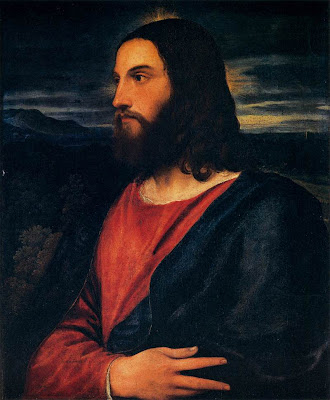INTROIT
Ps. 47:10-11 We have received Your kindness, O God, within Your temple. As Your name, O God, is known to the ends of the earth, so also shall Your praise be voiced to the ends of the earth. Your right hand is just in all things. Ps. 47:2. Great is the Lord, and worthy of all praise in the city of our god, upon His holy mountain. V. Glory be . . .
COLLECT - O Lord, we cannot exist without You. Inspire us to think and act rightly, that we may always live as You would have us live. Through our Lord . . .
EPISTLE
Rom. 8:12-17
Brethren: We are debtors, not to the flesh, to live after the flesh: for if ye live after the flesh, ye must die; but if by the Spirit ye put to death the deeds of the body, ye shall live. For as many as are led by the Spirit of God, these are sons of God. For ye received not the spirit of bondage again unto fear; but ye received the spirit of adoption, whereby we cry, Abba, Father. The Spirit himself beareth witness with our spirit, that we are children of God: and if children, then heirs; heirs of God, and joint-heirs with Christ; if so be that we suffer with him, that we may be also glorified with him.
GRADUAL
Be a God of protection to me, a place of shelter to give me safety. V. I have placed my trust in You, O God; let me never be put to shame.
Alleluia, alleluia! V. Ps. 47:2 Great is the Lord and worthy of all praise in the city of our God, upon His holy mountain. Alleluia!
GOSPEL
Luke 16: 1-9
At that time, Jesus spoke to His disciples this parable: "There was a certain rich man, who had a steward; and the same was accused unto him that he was wasting his goods. And he called him, and said unto him, 'What is this that I hear of thee? render the account of thy stewardship; for thou canst be no longer steward.' "And the steward said within himself, 'What shall I do, seeing that my lord taketh away the stewardship from me? I have not strength to dig; to beg I am ashamed. I am resolved what to do, that, when I am put out of the stewardship, they may receive me into their houses.' And calling to him each one of his lord's debtors, he said to the first, 'How much owest thou unto my lord?' And he said, 'A hundred measures of oil.' And he said unto him, 'Take thy bond, and sit down quickly and write fifty.' Then said he to another, 'And how much owest thou?' And he said, 'A hundred measures of wheat.' He saith unto him, 'Take thy bond, and write fourscore.' "And his lord commended the unrighteous steward because he had done wisely: for the sons of this world are for their own generation wiser than the sons of the light. And I say unto you, Make to yourselves friends by means of the mammon of unrighteousness; that, when it shall fail, they may receive you into the eternal tabernacles."
OFFERTORY
Ps. 17:28, 32
You will save the humble, O Lord, but the eyes of the proud You will bring low, for who is God except You, O Lord?
SECRET Accept these gifts, which Your bounty makes it possible for us to offer You, O Lord. May the grace of this sacred rite sanctify our lives on earth and bring us to eternal happiness. Through our Lord . . .
COMMUNION
Ps. 33:9
Taste and see how good is the Lord; blessed is the man who trusts in Him.
POST COMMUNION - May this heavenly Sacrament bring us health of soul and body, O Lord, and make us feel the power of the sacred rite we have celebrated. Through our Lord . . .
REFLECTION -
The theme of the Eighth Sunday is to account for your stewardship before God and then man. In the Epistle we are reminded of our divine filiation, and Our Lord tells us in a parable in today's Gospel of the duties thereby entailed. We are the children of God, since we may say in all truth: Our Father (Epistle). God has given us life, "wherefore we must life according to His will" (Collect).
Just as this rich landowner who, before giving his son his share of the heritage, wishes to test his administrative capability, by entrusting to him things of little value, God, before making us His heirs in Heaven, has wished to test our fidelity by giving us the management on earth of both temporal and spiritual goods. But, like the steward mentioned by Jesus, we have been unfaithful, dissipating by sin the riches and talents which God entrusted to us.
Therefore, vying in zeal with the children of the world, the sons of light imitate the foresight of the steward who, by means of his father's riches, prepared friends unto himself. Turning to profitable use what God has given to us, let us do good, and especially by almsgiving let us secure the testimony which the poor will bear their benefactors at the moment when all will have to give an account of their stewardship to the divine Judge.
Sources: Saint Andrew Daily Missal and the Marian Missal , 1945




.jpg)












